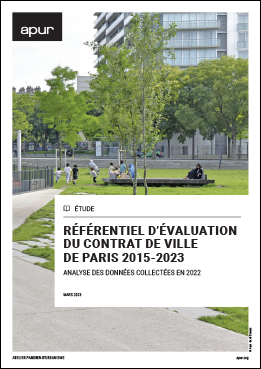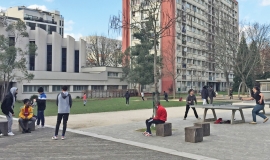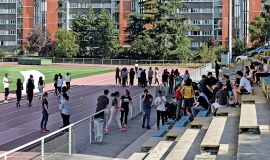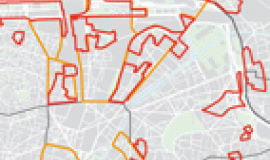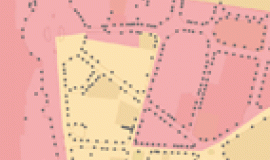Quantified data that make it possible to measure the actions carried out in neighbourhoods of the City’s Urban Cohesion Policy - les Quartiers de la Politique de la Ville -.

The Paris Urbanism Agency has supported the Government and the City of Paris for several years in their action focusing on neighbourhoods of the City’s Urban Cohesion Policy, particularly by running the Observatory of Parisian Priority Neighbourhoods. Since 2018, a lot of work has been done to contribute to assessing the 2015-2023 Paris City Contract.
In 2019, the signatory partners of the City Contract were involved in formulating a frame of reference which defines the details of each selected objective in the contract, the associated actions, the expected results and the indicators which make it possible to measure the implementation of the actions and the beneficiaries. The Assessment Frame of Reference is organised under three themes “Growing up: education, youth and parenting”, “Work: employment, integration and economic development” and “Living: living environment and urban renewal” and includes transversal themes (social links, access to rights, gender equality, health and the fight against discrimination). From 2020 to 2022, they were asked to complete the identified indicators in the reference framework. This document presents the analysis of data gathered over the entire period and at different levels (geographic priority and Paris), in order to report on the implementation of actions since the contract was signed.
Out the 178 actions under the three reference themes, a large majority (169) were documented by more than 30 partners (City of Paris Departments, Government Departments, Employment agencies, the Ile-de-France Department of Education - Académie de Paris -, the family benefit organisation - CAF -, the professional and social integration service for young people - Mission Local de Paris -, social landlords, etc.). The initiatives are of a very diverse nature : to reduce the gap in academic achievement, to promote access to jobs, to encourage the social and professional integration of young people, to promote local economic development, to prevent situations of precarity, to encourage mobility and diversity, to accompany urban transformation and integrate neighbourhoods better into the city, etc. Out of all the actions documented, 108 show a strengthening of the measures carried out in neighbourhoods since 2015, 17 show a decline and 29 show contrasting changes depending to the indicators.
The definition of measurement tools is essential to enable the guidance of actions carried out in Urban Cohesion Neighbourhoods, under common rights and the specific credits of the City’s Urban Cohesion Policy. The implementation of the Assessment Frame of Reference has involved the mobilisation of all the partners throughout the duration of the contract in order to provide accurate and useful information for all.

